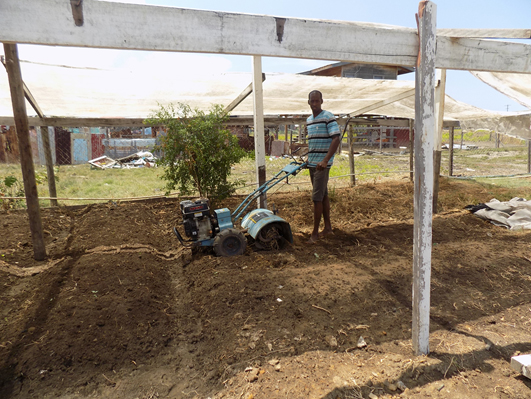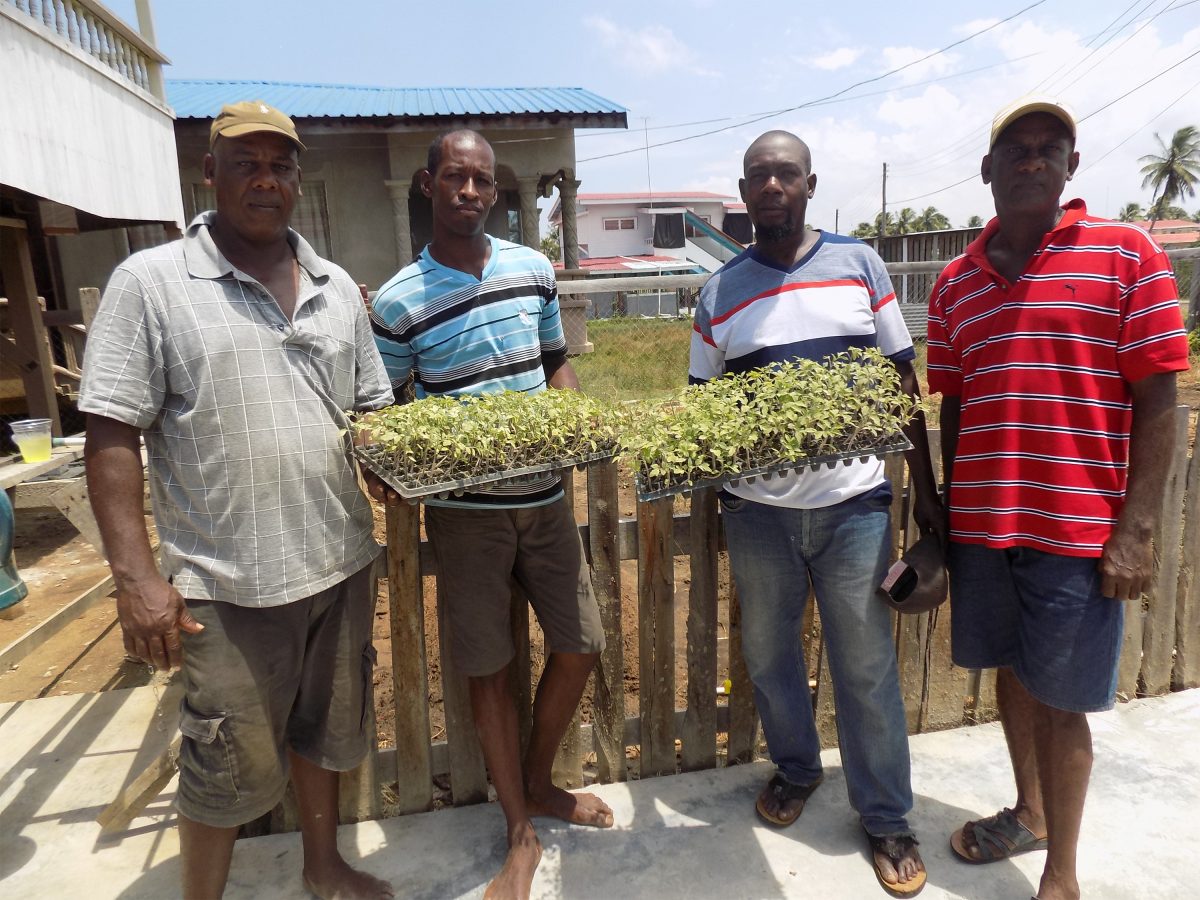The image of success and ‘plenty’ that so often characterizes Guyana’s agricultural sector conceals the hard work, sacrifice and frequently the frustration which, more often than we imagine, impacts their lives and livelihoods. Challenges and setbacks are, all too often, a way of life. They tend, all too often, to visit those farming communities where resources are limited and where, sometimes, the distance between disappointment and disaster can be razor thin.
Situated on the Central Corentyne corridor, approximately twenty-three miles from New Amsterdam Philippi is one of those farming communities that is no stranger to disappointment. The farmers there are known as much for their fine crops that include bell pepper, sweet pepper boulanger, pumpkin and cabbage (their watermelon, bora, tomato, eschellot and celery are also known to attract good markets) as for their resilience in enduring and finding ways around challenges and disappointment.
Bryan Albert, one of the formers we visited recently, had been known to us from his visit to the Providence UNCAPPED event staged by the Guyana Manufacturing & Services Association (GMSA) earlier this year. We were keeping a promise made to him during Providence meeting to ‘drop in’ on his farm whenever we were in that ‘neck of the woods.’

We had gone to Berbice that weekend ostensibly to attend the Berbice Expo and decided that this was the opportune moment to look in on the Berbice farmer. We got there while he and a handful of colleague farmers were constructing two additional pig pens, part of an initiative to enable his wife to expand her own pig-rearing business. Working on the pig pen together was the sort of ‘hand wash hand’ approach that made survival easier for each of them.
Mr. Albert’s wife’s first pig had been a gift from his father and the fact that two more pens were now under construction suggested that the pig-rearing venture had met with a fair measure of success.
The Alberts had started with crop farming but afterwards, had considered it prudent to diversify. These days they rear ducks as well. Duck meat, Albert told us, is popular on dinner tables and in restaurants in Berbice. While we were visiting the ‘going’ price was $600 per pound. Apparently there are these unpredictable peaks and troughs in supply and the widespread popularity of duck curry in Berbice meant that the farmers could make a killing. While we were there Albert was focused on ensuring that his “good customers” were kept supplied with duck meat. Once we had gotten past the matter of the duck meat shortage we settled down to a more wide-ranging conversation on farming at Philippi with Mr. Albert and his visiting farmer colleagues. The brothers Elvis and Ricardo Matterson and Maxwell Barry were there.
We began by reflecting on the Berbice Expo and Trade Fair. Elvis had attended the event to see whether there might be any agricultural equipment and other product that might be on the market and which, perhaps, might enhance his own farming operation. He was in the process of turning over in his mind the possibility of acquiring a boat engine.
Some general farming gossip followed and afterwards a more serious discourse about the challenges facing Philippi farmers. Inadequate water supply and crop diseases (the two frequently going hand in hand) are the bane of the farmers’ existence. As we spoke they were pursuing a practice known as “rain-fed farming,” a practice that depends entirely on rainfall to provide water for their plants.
The present water challenge, they say, derives from the fact that the ‘front lands’ on which their farms are located depend on water coming from the backlands. The flow is inefficient and the solution reposes in an engineering design that can improve the efficiency of the flow of water to the front lands. The villages from Number 43 to Whim, they say, suffer greatly.
Whilst we were visiting the farmers had been enduring a one-month period of drought. There had been a brisk shower the previous evening which the farmers said would offer a few days relief.
The Lesbeholden – Miciburi Irrigation canal is used to drain the back lands through the front lands. During the rainy season it is filled and the crops thrive. During the May to September mostly-dry period, the farmers face the twin challenges of little rain and blocked canals so that even the little water that is being pumped is not finding its way to the front lands. When we spoke with the farmers they told us that they were keeping their fingers crossed that a promised canal-cleaning exercise would begin shortly. That kind of ‘hit or miss’ scenario has become a way of life.
Beyond the cleaning of canals there is need for a reservoir that the farmers can access during the dry season. They say that they have written to all the relevant authorities including the Regional Chairman and Vice Chairman, Ministers of Government… anyone who would listen, all to no avail up until now.
They have, meanwhile, been searching for options. Mr. Albert says he has tried sea water. His cabbages, particularly, have not taken a liking to sea water and there have been some losses.
These may be experienced farmers but plant diseases and the what, frequently, is the indiscriminate application of fertilizer have often interfered with plant health and crop yield. Their scientific knowledge of plant diseases and the requisite remedial measures, they admit, is limited. It is a question of using what is available when diseases strike. They concede too that in those instances when there may be knowledge-enhancing events organized by the Ministry of Agriculture they rarely if ever attend. Crop losses, however, are causing them to begin to see ‘the light.’
Sometime the losses can be devastating. Elvis Matterson related a recent instance in which of the acre and a half of boulanger which he planted, he reaped a mere two bags. Under normal circumstances his return would have been around seventy-five bags!
The shortage of labour to serve as farm hands is also among the challenges confronting the Philippi farmers. Young men from the community are reluctant to work as farm hands. As in other parts of the country drinking and idling are frequently preferred choices. As we spoke, Mr. Albert was worrying over a watermelon crop that was approaching harvesting time. The threat of it remaining un-harvested was real.
The farmers of Philippi sell their produce to the middlemen who routinely visit the village. They also take advantage of events like the Guyana Marketing Corporation’s (GMC) Farmers’ Market and the UNCAPPED event which is staged periodically.
None of the men at Philippi with whom we spoke sought to conceal the challenges associated with farming. Cultivating food, however, is what they know. It has it peaks and its troughs and from all appearances they appear to have, long ago, adjusted to the what, every so often, are the corridors of uncertainty through which they must travel in order to make a living.





